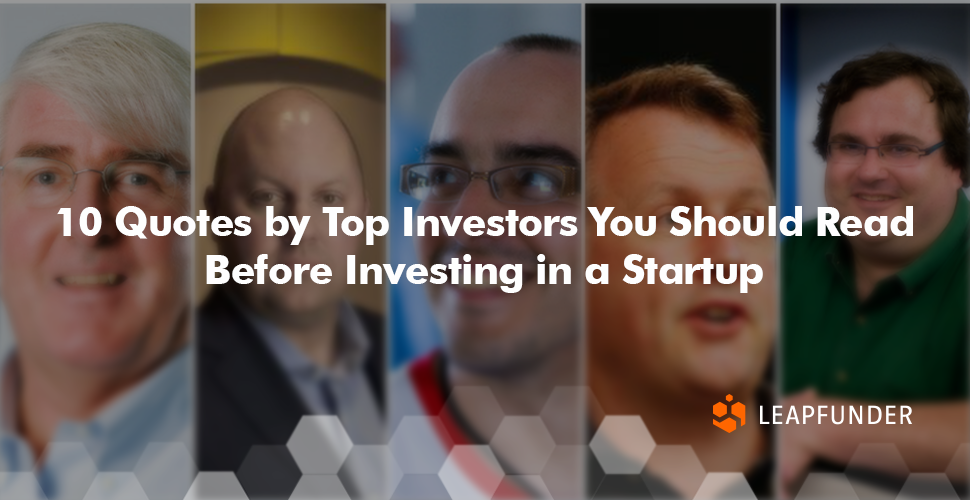Investing successfully in startups takes more than a pocketful of cash. That’s why we’ve handpicked invaluable tips and tricks of the trade of investing in startups. Before you invest in a startup make sure you read 10 extremely helpful quotes from Silicon Valley’s most successful investors!

Tips and tricks from top investors
1. Ron Conway doesn’t agree with your motives.
“I invest because I love helping entrepreneurs and watching them learn and succeed. In my opinion, your motives are driven by self serving factors around ego satisfaction and “making a buck”. My motives and values are very different.” Ron Conway in his email to Super Angels
2. Master valuing things that have not yet happened.
“Smart tech investor thinks about: a) future product roadmap, b) bottoms-up market size & growth, c) talent and skill of team. Essentially you are valuing things that have not yet happened, and the likelihood of the CEO and team being able to make them happen. Finance people find this appalling, but investors who do this well can make a lot of money.” Marc Andreessen shares investment tips on Twitter
3. Have enough deal-flow.
“If you are a new investor, you’re going to want to see many deals before pulling the trigger on any of them. Try to learn as much as you can about the market before investing.” Ed Roman
4. Wait until companies have an initial prototype.
“Wait until companies have an initial prototype, have shown that they have the potential to be profitable and have the ability to scale. That’s the best time to invest.” Dave McClure
5. How do we get to one million users?
“How will you reach a massive audience? In real estate the wisdom says “location, location, location.” In consumer Internet, think “distribution, distribution, distribution.” Thousands of products launch every month on hundreds of thousands of new Web pages. How does a company rise above the noise to attract massive discovery and adoption? Reid Hoffman’s first of his rule of three for investing
6. Invest in a monopoly.
“The business model piece is we’re always talking about competing more effectively. If you’re starting a company or career you don’t want to compete. You want to create a monopoly. We want to invest in a company that has a good plan to create a monopoly.” Peter Thiel
7. Don’t expect to become the entrepreneur’s boss.
“Entrepreneurs usually don’t listen to people. Trust them to do their job. Remember, you invested with the understanding the project was likely to fail.” Dave McClure
8. Diversify your portfolio.
“Startups fail more than they succeed. A lot more, in fact. Experts haven’t settled on an exact number, but studies peg startup fail rates anywhere from 75% to as high as 90%. To combat these risks, professionals hedge their bets by diversifying their investments across multiple companies. When someone goes out and becomes a professional angel, they’re allocating a certain percentage of their net worth to go out and make 10, 15, 20 different bets. “They have a large enough pool that hopefully they’ll find some winners in there. Investors can also minimize their financial risk by teaming up on investments with friends or colleagues.” Kevin Rose
9. Decide quickly if you dare.
“I think one of the biggest unexploited opportunities in startup investing right now is angel-sized investments made quickly. Few investors understand the cost that raising money from them imposes on startups. When the company consists only of the founders, everything grinds to a halt during fundraising, which can easily take 6 weeks. The current high cost of fundraising means there is room for low-cost investors to undercut the rest. And in this context, low-cost means deciding quickly. If there were a reputable investor who invested $100k on good terms and promised to decide yes or no within 24 hours, they’d get access to almost all the best deals, because every good startup would approach them first. It would be up to them to pick, because every bad startup would approach them first too, but at least they’d see everything. Whereas if an investor is notorious for taking a long time to make up their mind or negotiating a lot about valuation, founders will save them for last. And in the case of the most promising startups, which tend to have an easy time raising money, last can easily become never.” Paul Graham
10. Enjoy
“Always wake up with a smile knowing that today you are going to have fun accomplishing what others are too afraid to do.” Marc Cuban
We hope you found these useful. We invite you to sign up for Leapfunder and find a startup you believe in!


